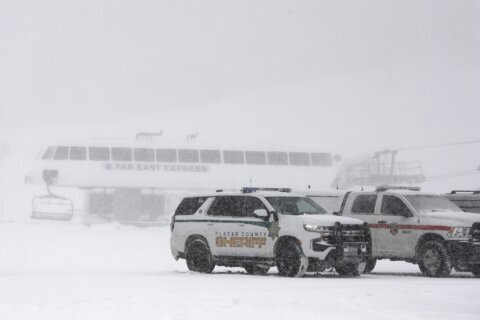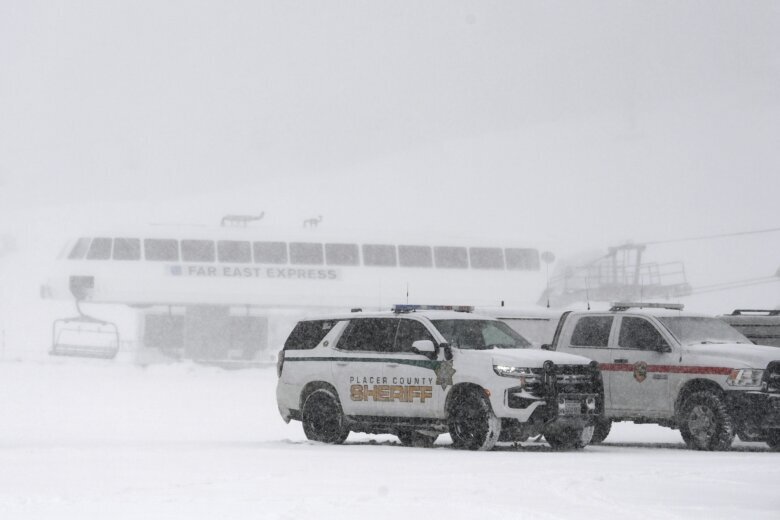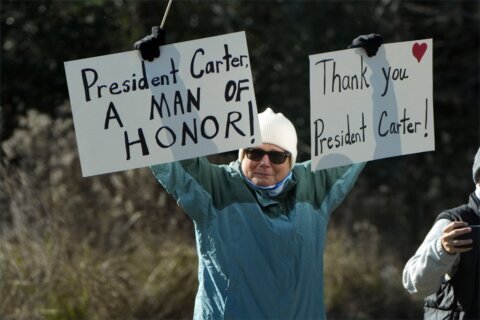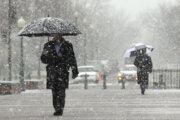
RENO, Nev. (AP) — An avalanche was reported Thursday at a California resort near Lake Tahoe, one day after a major avalanche roared down an adjoining mountain, trapping several people and killing a 66-year-old man.
The second avalanche occurred around 12:30 p.m. Thursday near the Wolverine Bowl section of Alpine Meadows, said resort spokesperson Patrick Lacey. No employees or guests were injured, though ski patrol searched the area with probes, beacons and a dog team to be sure, he said.
Wednesday’s death at the sister mountain Palisades Tahoe was the first U.S. avalanche fatality of the season, according to the Colorado Avalanche Information Center. Such deaths are far more likely to occur on unmaintained, back-country slopes rather than resort trails.
After closing down every lift and trail in the aftermath of Wednesday’s avalanche, Palisades reopened many runs on Thursday. But its iconic KT-22 lift, which serves the area of mostly expert runs where the slide occurred, remained closed while crews worked to clear a road to enable snowcats and snowmobiles to enter and clean up.
The resort said it would be a “rigorous snow safety day.” About half the lifts at Alpine Meadows were open, but the gondola connecting it to Palisades remained closed. Lifts serving Wolverine Bowl were reopened after Thursday’s snowslide.
A storm had blanketed the area when Wednesday’s avalanche hit around 9:30 a.m., sweeping up four people. The debris field spanned about 150 feet (46 meters) wide, 450 feet (137 meters) long and 10 feet (3 meters) deep, the Placer County Sheriff’s Office said.
Janet He said she and her husband had just gotten off KT-22 when she felt the ground slip away under her skis. After tumbling about 200 feet (60 meters) down the slope, she ended up buried under snow, unable to breathe, she told CBS 13. She asked herself, “Am I going to die here?”
Her husband, Joseph Lu, was above, frantically using a ski pole to punch in the snow to find his wife. A stranger managed to locate her and pull her to safety.
“He says, ‘No worries, I got you,’” Janet recalled. “I think that’s the best thing I ever heard in my life.” She walked away uninjured. And the couple said they planned to ski again Thursday.
Palisades, the site of the 1960 Winter Olympics, is on the western side of Lake Tahoe, about 40 miles (64 kilometers) from Reno, Nevada.
The sheriff’s office identified the person killed as Kenneth Kidd, a resident of nearby Truckee and Point Reyes. One person suffered a lower leg injury and two others were treated for unspecified injuries and released, officials said.
Ethan Greene, the Colorado Avalanche Information Center’s executive director, said ski resorts have become very good at mitigation work and triggering small snowslides intentionally when the slopes are closed to prevent avalanche accidents. Just 3% of the 244 avalanche deaths in the U.S. in the past 10 years have been in “open, operating areas of ski resorts,” he said.
But he said it’s impossible to prevent them from occurring altogether.
“We are dealing with Mother Nature. We are dealing with a natural hazard in very complex systems in mountain environments,” Greene said.
The Sierra Avalanche Center’s forecast for the central Sierra backcountry predicted continuing dangerous avalanche conditions Thursday.
Another skier caught in Wednesday’s avalanche estimated that he was buried under about a foot of snow and debris for about eight minutes. Jason Parker said he was enjoying the fresh powder when he was hit by a wave of snow, “going headfirst, trying to swim to the top.”
After coming to a halt, Parker screamed for several minutes before telling himself to calm down and save oxygen. “It was so weird,” he told KCRA 3, adding that he began to think, “This is the way you’re going out.”
Just as he began to lose consciousness, searchers broke through and created an airway for him as they dug him out.
“It was locals,” he said. “People that know the area well, and that saved me. I can’t thank them enough.”
The KT-22 lift opened for the first time this season just 30 minutes before the avalanche. It had been a slow start to the region’s snow season.
“A lot of work goes into prepping these two lifts, even with the help of more than two feet (62 centimeters) of recent snowfall up top,” the resort had posted Monday. It characterized the existing snow as light in density.
Michael Gross, vice president of mountain operations, said before deeming an area safe to open, the team evaluates the conditions relying on their expertise and historical data.
“You know, we’ve got decades worth of weather data that we’re always resourcing or referencing, so looking at current forecasts, looking at all different models, looking at wind speed, snow density, wind direction,” Gross told reporters Wednesday. “There’s a variety of things that go into play and the people that are doing the work are truly experts in their field.”
Most avalanches happen during or soon after a big snowstorm, a period of strong winds or during a rapid increase in temperature, according to forecasters. They are possible any time snow is on a slope steeper than about 30 degrees and can be triggered by humans moving across the area, or more frequently by natural occurrences involving the weight of overhanging snow and or wind events.
An average of about 24 people have died annually in avalanches in the U.S. over the past decade, according to the Colorado Avalanche Information Center.
A 2020 avalanche at Alpine Meadows killed one skier and seriously injured another a day after a major storm. Another avalanche at the resort in March 1982 killed seven people, including several employees.
Greene is warning outdoor enthusiasts to be prepared for a significant increase in avalanche danger during the upcoming holiday weekend in Colorado and the Rocky Mountains. Like the Sierra Nevada, the region has had below-normal snowfall prior to the past week, when a bout of winter storms moved through, and more is on the way.
“We could have a generally below average winter, but if a dry period is followed by a really wet period, that could be enough to produce a really big avalanche cycle.”
_____
Weber reported from Los Angeles. Associated Press writers John Antczak in Los Angeles and Julie Watson in San Diego contributed to this report.
Copyright © 2025 The Associated Press. All rights reserved. This material may not be published, broadcast, written or redistributed.








